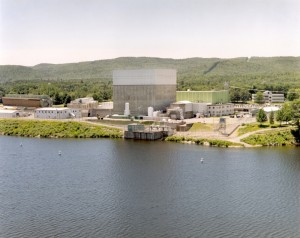There’s no question that nuclear power will be part of our energy supply mix for the foreseeable future. The United States has 104 nuclear power plants in operation at present, according to Matthew Wald on the Green Inc. blog of The New York Times, relying on NRC data. Incidents like this – in which a corporate official makes a false statement with serious health and safety implications – give us pause.
Which is worse – that the official was mistaken, and not aware that Vermont Yankee had water pipes which could leak – or that he knew and lied?
Incompetence or dishonesty, it would seem. Nuclear power can’t be a safe part of our energy future on those terms. Entergy is responsible for knowing everything there is to know about the plants it operates. A material and incorrect statement – under oath, no less – seems explainable only by three hypotheses: (1) the official lied; (2) the official failed to make himself aware of the plant, in which case the question shouldn’t have been answered; (3) the official was misinformed by subordinates.
If the first explanation is correct, perjury charges are, of course, in order. If the second or the third – Entergy hasn’t met its obligations to mind the store.
From the Associated Press via NPR: Top Vermont Yankee Official ‘Relieved Of Duties’:
A top official at the Vermont Yankee nuclear plant was permanently relieved of his duties and placed on leave, the plant owner’s CEO said Tuesday, less than a week after Gov. Jim Douglas demanded management changes over misstatements made to state officials.
Entergy Nuclear chief executive J. Wayne Leonard did not identify the official by name. But he described the executive relieved of his duties in a way that could only apply to Vice President Jay Thayer.
Douglas’ urging for management shake-up followed revelations that plant officials misled state regulators and lawmakers by saying last year the plant did not have the sort of underground pipes that could carry radioactive tritium.
“In May 2009, an Entergy executive testified in a hearing on the state’s report that he didn’t think we had any such pipes, but he would get back to them,” Leonard said. “He did not get back to them. He has issued a public apology and made clear that he failed to provide full and complete information, either on the witness stand or by failing to get back to them.
“He has been permanently relieved of his duties in Vermont, and placed on administrative leave pending the outcome of the full investigation,” Leonard added.
Calls to Thayer’s home were not immediately returned Tuesday.
On Jan. 7, it was announced that tritium, an isotope said to cause cancer if ingested in high amounts, had been found in elevated levels in a groundwater monitoring well at Vermont Yankee. Plant and federal Nuclear Regulatory Commission officials have maintained tritium has not appeared in groundwater at concentrations that pose any threat to public health or safety.
On Tuesday, plant spokesman Robert Williams said the highest reading yet of tritium had been reported in a monitoring well at the Vernon reactor. The latest reading is four times the Environmental Protection Agency’s safety limit for tritium in drinking water.
Leonard, speaking Tuesday about the company’s fourth-quarter 2009 results to shareholders and analysts in a conference call, gave an update on Entergy Nuclear’s plan to spin off a new company to own Vermont Yankee and four other northern nuclear stations.
Leonard raised the possibility that the plan could go ahead without including Vermont Yankee if the state fails soon to approve the spinoff; he said a lack of approval in Vermont might merely move completion of the deal from this spring to later in the year.
Vermont Yankee is not profitable for Entergy under the terms under its current deal to sell power to Vermont’s electric utilities, Leonard said. The company is hoping to operate the plant for 20 years past the expiration of its current license in 2012 and says it will seek higher prices from the utilities then.
See alsoMatthew L. Wald, Vermont Power Plant Continues to Leak Radiation.
Technicians seeking the source of a leak of radioactive tritium at the Vermont Yankee nuclear plant have found concentrations in groundwater there that were three times higher than what was discovered last week, a plant spokesman said Monday.
Tritium was measured at 70,500 picocuries per liter, which the spokesman, Rob Williams, characterized as a low level. The highest level discovered so far “does not present a risk to public health or safety whatsoever,” he said in a statement.
But it does put Vermont Yankee over the threshold at which it is obligated to make a report to federal regulators within 30 days, and say what it will do about the problem. The limit, 30,000 picocuries, was crossed on Sunday.
